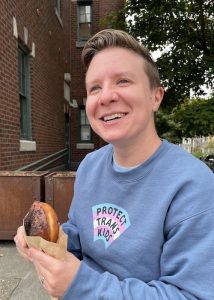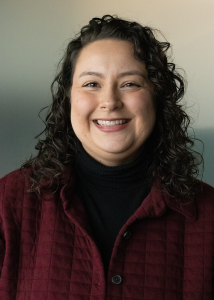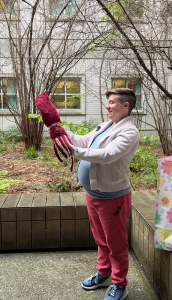Starting in May 2024, Francesca Collins will temporarily take over as capstone director for the Community-Oriented Public Health Practice (COPHP) MPH program for Genya Shimkin while Shimkin is on parental leave. Currently, Collins serves as the program’s curriculum and strategic planning director.
COPHP is a two-year program designed for adult learners. Students are grouped into cohorts and learn in small groups. Coursework is problem-based and wide-ranging, sprinkling in what Collins called “a little bit of everything,” while centering community health through the lens of diversity, equity, and inclusion.

Explained Genya in an email interview, “At a time where we see public health challenges all around us–from climate change to gun violence to racism to abortion rights and attacks on trans people–we need a public health workforce that understands the intersections and connections between issues, and can understand both upstream structural issues and downstream consequences on communities. In COPHP we want to build and launch cohorts of graduates who think critically, engage deeply, and work intentionally to address the issues that undermine health at all levels.”
For their capstone, students complete a hands-on, practice-based public health project in partnership with a community organization, which may be a non-profit, health department, research center, etc. Projects are intended to simultaneously improve community health and answer a research question. They may take the form of a program evaluation, community needs assessment, new curriculum, education campaign, or policy proposal. Topics this year include drug user health, transgender health, climate change and air pollution, immigrant health, sex worker empowerment, and youth-led violence prevention.
Shimkin reflected, “Overseeing the capstone program is one of my favorite roles because I love working with such engaged students; they bring such excitement and energy to their work and I love following along, offering support and encouragement, and bearing witness to their creativity and brilliance.”

Capstones provide an opportunity for students to take charge of their education, said Collins. “Students get quite a bit of project management and leadership experience as they execute their capstone project, because they’re the ones running their own show. So they need to make sure that they stay on top of things from start to finish,” she explained in an email interview.
In addition to running the capstone program, Shimkin and Collins have held myriad roles in public health, both at UW and in the broader community.
Collins graduated from San Diego State University with a major in Public Health and a minor in Women’s Studies, with an emphasis on counseling. She participated in a peer education program, and became passionate about reproductive health and healthy relationships. As an OB-GYN session counselor, she supported students seeking gynecological services from the campus health center. After graduating, she became a community health worker at a San Diego nonprofit that provides services to the Latino community, helping patients navigate their treatment options as an HIV test counselor and leading a program to integrate HIV testing into primary care.
Collins earned her MPH in the COPHP program in 2017. For her Capstone, she developed an IUD Self-Removal Guide in partnership with the UW’s Department of Obstetrics & Gynecology. Since then, she has supported the program in various ways before embarking on her current role as curriculum and strategic planning director. She also teaches a course, HSERV 531: COPHP Population Health and Community Development, that builds from her expertise.
“It’s so wild to me that I was once in the classroom, and now I’m an instructor in the program. Gosh, it feels like such a privilege,” reflected Collins. “When I was in the program, something that made all of the difference in my experience was the amazing mentorship that I received. I really want to invest myself into the program because I know it made a big difference to me, and I know it has the potential of making a big difference for students. I was the first person in my family to get an undergraduate degree, [and] so was my partner, and that feels so amazing.”
Outside of UW, Collins is an Education Consultant for Public Health – Seattle & King County. She crafts health education campaigns and initiatives around HIV, STI, and Hepatitis C. prevention.

Meanwhile, Shimkin graduated from Bard College with degrees in Russian Studies and Human Rights in 2008, and earned their MPH in COPHP in 2013. They have since conducted research on public health issues including pedestrian safety on Rainier Avenue, experiences of BIPOC medical students in rural clinical rotations, and preventing transmission of HIV among patients at Harborview. They have also designed curricula for UW’s medical school and Public Health – King County. Their COPHP capstone, the Q Card Project, has since taken on a life of its own.
Explained Shimkin, “Originally the project was a feasibility study to explore the possibility of creating a new communication tool to empower queer and trans young people and educate their healthcare providers. The response was so overwhelmingly positive that it quickly became clear that the project needed to continue beyond my initial work. Over the past 10 years, I’ve distributed over 500,000 Q Cards, and worked with COPHP capstone students to develop training curricula, strategic communication plans, program evaluations, and most recently a companion tool specifically for trans youth. I certainly never expected my capstone to become such a big part of my life, and it’s been such an amazing experience to watch it grow.”
Collins is excited to take on Shimkin’s capstone work. “I have the ultimate pleasure of stepping in for my colleague and good friend, Genya, who has been the capstone director since 2021. There are certainly big shoes to fill there. What’s really cool is that myself, Genya, and her predecessor have all been program alumni,” said Collins.